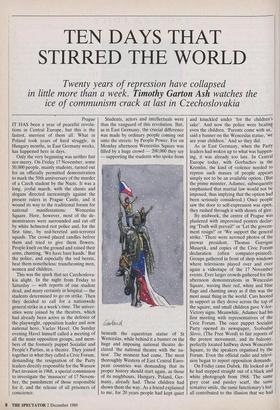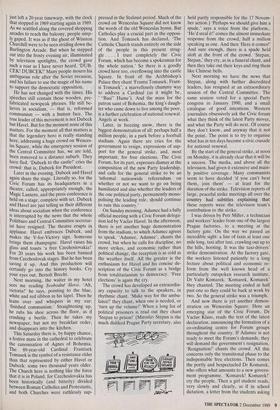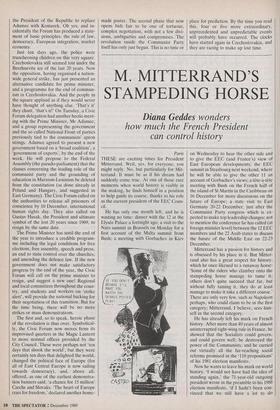TEN DAYS THAT STIRRED THE WORLD
Twenty years of repression have collapsed ice of communism crack at last in Czechoslovakia
Prague IT HAS been a year of peaceful revolu- tions in Central Europe, but this is the fastest, merriest of them all. What in Poland took years of hard struggle, in Hungary months, in East Germany weeks, has happened here in days.
Only the very beginning was neither fast nor merry. On Friday 17 November, some 50,000 people, mainly students, turned out for an officially permitted demonstration to mark the 50th anniversary of the murder of a Czech student by the Nazis. It was a long, joyful march, with the chants and slogans' directed increasingly against the present rulers in Prague Castle, and it wound its way to the traditional forum for national manifestations: Wenceslas Square. Here, however, most of the de- monstrators were surrounded and cut off by white helmeted riot police and, for the first time, by red-bereted anti-terrorist squads. The crowd placed candles before them and tried to give them flowers. People knelt on the ground and raised their arms, chanting, 'We have bare hands.' But the police, and especially the red berets, beat them nonetheless: truncheoning men, women and children.
This was the spark that set Czechoslova- kia alight. In the night from Friday to Saturday — with reports of one student dead, and many certainly in hospital — the students determined to go on strike. Then they decided to call for a nationwide general strike in a week's time. The univer- sities were joined by the theatres, which had already been active in the defence of the playwright, opposition leader and now national hero,. Vaclav Havel. On Sunday evening Havel himself called a meeting of all the main opposition groups, and mem- bers of the formerly puppet Socialist and People's Parties, in a theatre. They joined together in what they called a Civic Forum, demanding the resignation of the Party leaders directly responsible for the Warsaw Pact invasion in 1968, a special commission to investigate the 'massacre' of 17 Novem- ber, the punishment of those responsible for it, and the release of all prisoners of conscience. Students, actors and intellectuals were thus the vanguard of this revolution. But, as in East Germany, the crucial difference was made by ordinary people coming out onto the streets: by People Power. For on Monday afternoon Wenceslas Square was filled by a huge crowd — 200,000 they say — supporting the students who spoke from beneath the equestrian statue of St Wenceslas, while behind it a banner on the huge and imposing national theatre de- clared 'the national theatre with the na- tion'. The moment had come. The most thoroughly Western of East Central Euro- pean countries was demanding that its proper history should start again, as those of its neighbours, Hungary, Poland, Ger- many, already had. These children had shown them the way. As a friend explained to me, for 20 years people had kept quiet and knuckled under 'for the children's sake'. And now the police were beating even the children. 'Parents come with us,' said a banner on the Wenceslas statue, 'we are your children.' And so they did.
As in East Germany, when the Party leaders had woken up to what was happen- ing, it was already too late. In Central Europe today, with Gorbachev in the Kremlin, the kind of violence needed to repress such masses of people appears simply not to be an available option. (But the prime minister, Adamec, subsequently emphasised that martial law would not be imposed, thus implying that the option had been seriously considered.) Once people saw the door to self-expression was open, they rushed through it with shouts of glee.
By midweek, the centre of Prague was plastered with improvised posters declar- ing 'Truth will prevail!' or 'Let the govern- ment resign!' or 'We support the general strike.' There were xeroxed photos of the prewar president, Thomas Garrigue Masaryk, and copies of the Civic Forum declaration (often computer-printed). Groups gathered in front of shop windows where televisions played over and over again a videotape of the 17 November events. Ever larger crowds gathered for the afternoon demonstrations in Wenceslas Square, waving their red, white and blue flags and chanting away as if this was the most usual thing in the world. Cars hooted in support as they drove across the top of the square, and small children gave V-for- Victory signs. Meanwhile, Adamec had his first meeting with representatives of the Civic Forum. The once puppet Socialist Party opened its newspaper, Svobodne Slovo, (The Free Word) to fair reports of the protest movement, and its balcony, perfectly located halfway down Wenceslas Square, to the speakers organised by the Forum. Even the official radio and televi- sion began to report opposition demands. On Friday came Dubek. He looked as if he had stepped straight out of a black and white photograph from 1968. The same grey coat and paisley scarf, the same tentative smile, the.same functionary's hat: all contributed to the illusion that we had
just left a 20-year timewarp, with the clock that stopped in 1969 starting again in 1989. As we scuttled along the covered shopping arcades to reach the balcony, people simp- ly gaped. It was as if the ghost of Winston Churchill were to be seen striding down the Burlington Arcade. But when he stepped out into the frosty evening air, illuminated by television spotlights, the crowd gave such a roar as I have never heard. 'DUB- CEK! DUBCEK!' Many people mourn his ambiguous role after the Soviet invasion, and his failure to use the magic of his name to support the democratic opposition.
He has not changed with the times. His speeches still contain those wooden, pre- fabricated newspeak phrases. He still be- lieves in socialism, — that is, reformed communism — with a human face. The true leader of this movement is not Dubcek but Havel. But for the moment none of this matters. For the moment all that matters is that the legendary hero is really standing here, addressing a huge crowd on Wences- las Square, while the emergency session of the Central Committee has, we are told, been removed to a distance suburb. They have fled. Dubcek to the castle!' cries the crowd: that is, Dubcek for President.
Later in the evening, Dubcek and Havel again share the stage. Literally so, for the Civic Forum has its headquarters in a theatre, called, appropriately enough, the Magic Lantern, and the press conference is held on a stage, complete with set. Dubcek and Havel are just telling us their different ideas about socialism when the conference is interrupted by the news that the whole Politburo and Central Committee secretar- iat have resigned. The theatre erupts in applause. Havel embraces Dubcek, and makes the V-for-Victory sign. Someone brings them champagne. Havel raises his glass and toasts 'a free Czechoslovakia!' For 20 years his work has been banned from Czechoslovak stages. But he has been saving it up. And this production will certainly go into the history books. Cry your eyes out, Bertolt Brecht.
Next morning, the waiter in my hotel sees me reading Svobodne Slovo. `Ah, victoria!' he says, pointing to the blue, white and red ribbon in his lapel. Then he leans over and whispers in my ear: `finished communism.' Straightening up, he rubs his shoe across the floor, as if crushing a beetle. Then he takes my newspaper, but not my breakfast order, and disappears into the kitchen. This Saturday there is, by happy chance, a festive mass in the cathedral to celebrate the canonisation of Agnes of Bohemia. The 89-year-old Cardinal Frantisek Tomasek is the symbol of a resistance older than that represented by either Havel or Dubcek: some two thousand years older. The Church here is nothing like the force that it is in Poland, for Czechoslovakia has been historically (and bitterly) divided between Roman Catholics and Protestants, and both Churches were ruthlessly sup-
pressed in the Stalinist period. Much of the crowd on Wenceslas Square did not know the words of the old Wenceslas hymn. But Catholics play a crucial part in the opposi- tion. And Tomasek has declared, 'The Catholic Church stands entirely on the side of the people in this present strug- gle . . I trust completely the Civic Forum, which has become a spokesman for the whole nation.' So there is a goodly crowd here too, overflowing into the castle Square. In front of the Archbishop's Palace they chant 'Frantsi Tomasek, Frant- si Tomasek', a marvellously chummy way to address a Cardinal (as it might be, "Basi" Hume'). And the mass for the patron saint of Bohemia, the king's daugh- ter who came down to live among the poor, is a further celebration of national renewal. Angels at work.
Later, in freezing snow, there is the biggest demonstration of all: perhaps half a million people, in a park before a football stadium. Again there are cries for the government to resign, expressions of sup- port for the general strike, and, most important, for free elections. The Civic Forum, for its part, expresses dismay at the composition of the new Party leadership, and calls for the general strike to be an `informal nationwide referendum on whether or not we want to go on being humiliated and also whether the leaders of the one political party, permanently mono- polising the leading role, should continue to ruin this country.' On Sunday morning, Adamec had a fully official meeting with a Civic Forum delega- tion led by Vaclav Havel. In the afternoon, there is yet another huge demonstration from the stadium, to which Adamec agrees to speak. 'Adamec, Adamec', chants the crowd, but when he calls for discipline, no more strikes, and economic rather than political change, the reception is as cold as the weather itself. All the greater is the enthusiasm for Havel and his concise de- scription of the Civic Forum as a bridge from totalitarianism to democracy. 'Free elections' is again the cry. The crowd has developed an extraordin- ary capacity to talk to the speakers, in rhythmic chant. 'Make way for the ambu- lance!' they chant, when one is needed, or `turn up the volume!' When a long list of political prisoners is read out they chant `Stepan to prison!' (Miroslav Stepan is the much disliked Prague Party secretary, also held partly responsible for the 17 Novem- ber action.) 'Perhaps we should give him a spade,' says a voice from the platform,. `He'd steal it!' comes the almost immediate response from the crowd, half a million speaking as one. And then 'Here it comes!' And sure enough, there is a spade held aloft at the front of the crowd. 'Stepan, Stepan,' they cry, as in a funeral chant, and then they take out their keys and ring them like Chinese bells.
Next morning we have the news that Stepan, along with further discredited leaders, has resigned at an extraordinary session of the Central Committee. The same session voted for a special Party congress in January 1990, and a small catalogue of good intentions. Western journalists obsessively ask the Civic forum what they think of the latest Party moves, and what the Party will do next. Of course they don't know, and anyway that it not the point. The point is to try to organise what has in ten days become a civic crusade for national renewal.
By the start of the general strike, at noon on Monday, it is already clear that it will be a success. The media, and above all the television, had given it extensive and main- ly positive coverage. Many communists seem to have decided 'if you can't beat them, join them' — at least for the duration of the strike. Television reports of large, peaceful strike meetings all over the country had subtitles explaining that these reports were the television team's contribution to the strike.
I was driven by Petr Miller, a technician and workers' leader from one of the largest Prague factories, to a meeting at the factory gate. On the way we passed an incredible sight: a line of taxis at least one mile long, taxi after taxi, crawling out up to the hills, hooting. It was the taxi-drivers' strike demonstration. At the factory gate, the workers listened patiently to a long lecture about political and economic re- form from the well known head of a particularly outspoken research institute, Dr Valtr Komarek. 'Komarek, Komarek' they chanted. The meeting ended at half past one so they could be back at work by two. So the general strike was a triumph.
And now there is yet another demon- stration on Wenceslas Square. Here an emerging star of the Civic Forum, Dr Vaclav Klaus, reads the text of the latest declaration, announcing the formation of a co-ordinating centre for Forum groups throughout the country. If Adamec is not ready to meet the Forum's demands, they will demand the government's resignation. `Resignation!' chants the crowd. All this concerns only the transitional phase to the indispensable free elections. Then comes the portly and bespectacled Dr Komarek, who offers what amounts to a new govern- ment programme. 'Komarek! Komarek!' cry the people. Then a girl student reads, very slowly and clearly, as if in school dictation, a letter from the students asking the President of the Republic to replace Adamec with Komarek. Oh yes, and in- cidentally the Forum has produced a state- ment of basic principles: the rule of law, democracy, European integration, market economy.
Just ten days ago, the police were truncheoning children on this very square. Czechoslovakia still seemed lost under the Brezhnevite ice of the last 20 years. Now the opposition, having organised a nation- wide general strike, has just presented an alternative candidate for prime minister, and a programme for the end of commun- ism in Czechoslovakia. And the people in the square applaud as if they would never have thought of anything else. 'That's it' they chant, 'that's it!' On Tuesday, a Civic Forum delegation had another hectic meet- ing with the Prime Minister, Mr Adamec, and a group representing the government and the so called National Front of parties previously tied to the communists' apron strings. Adamec agreed to present a new government based on a 'broad coalition', a 'government of experts', by the end of the week. He will propose to the Federal Assembly (the pseudo-parliament) that the clauses concerning the leading role of the communist party and the grounding of education in Marxism-Leninism be deleted from the constitution (as done already in Poland and Hungary, and suggested in East Germany). The Civic Forum called on the authorities to release all prisoners of conscience by 10 December, international human rights day. They also called on Gustav Husak, the President and ultimate symbol of the lost 20 years since 1969, to resign by the same date.
The Prime Minister has until the end of the year to introduce a credible program- me including the legal conditions for free elections, free assembly, speech and press, an end to state control over the churches, and amending the defence law. If the new government does not make satisfactory progress by the end of the year, the Civic Forum will call on the prime minister to resign, and suggest a new one! Regional and local committees throughout the coun- try, and students and workers on 'strike alert', will provide the national backing for their negotiation of this transition. But for the time being, there will be no more strikes or mass demonstrations.
The first and, so to speak, heroic phase of the revolution is thus over. Symbolical- ly, the Civic Forum now moves from its improvised quarters in the Magic Lantern to more normal offices provided by the City Council. These were perhaps not 'ten days that shook the world', but they were certainly ten days that delighted the world, changed the political face of Europe (for all of East Central Europe is now sailing towards democracy), and, above all, offered, as one of the earliest demonstra- tion banners said, 'a chance for 15 million' Czechs and Slovaks. 'The heart of Europe cries for freedom,' declared another home-
made poster. The second phase that now opens bids fair to be one of tortuous, complex negotiation, with not a few divi- sions, ambiguities and compromises. The revolution inside the Communist Party itself has only just begun. This is no time or place for prediction. By the time you read this, four or five more extraordinary, unprecedented and unpredictable events will probably have occurred. The clocks have started again in Czechoslovakia, and they are racing to make up lost time.












































































 Previous page
Previous page